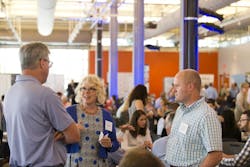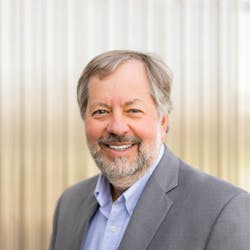The Water Council’s Water Leaders Summit is an annual water industry conference that brings together water business leaders, governmental entities, academics, entrepreneurs and futurists from around the world for conversations about current global water challenges and the future of water innovation.
WWD Associate Editor Sara Myers spoke to Water Council CEO Dean Amhaus and Communications Manager Taylor Baseheart about the upcoming summit.
Sara Myers: How has The Water Summit evolved from when it started?
Dean Amhaus: I was there at the beginning. I was pulling together the first one and that was a gathering for two hours with about 60 people over at Discovery World in Milwaukee. It was a session where we brought some people together, community people, interested parties, and we had no idea where it was going. After two hours of saying, “Here's what we've got and what we'd like to do,” we asked “Do you all want to just keep on meeting?” And from that point to now, we kept on meeting and it has grown since then. So it's been a remarkable change dramatically in the course over that time. It has certainly evolved in different fashions and locations and so on. But it's been exciting to see how it's developed and also to develop a national reputation as well.
Myers: What are some trends you’re hoping to highlight this year?
Amhaus: One of the things that we are seeing, and this is not a replacement from the sense of utilities, and the importance of utilities from drinking water and waste, but we also believe that there is a real demand and a growing demand from the industrial water users and they're taking on the need to solve their problems themselves for multiple reasons. I think they're being pushed, they're seeing that there is a value on that as well. So, what we are going to do is continue with this is to say how are the industrial water users, moving forward in this changing environment? It's rethinking water. How are they rethinking their use of water in their facilities? How does it impact upon their watershed as well? A lot of companies that can do some of these things on their own and have to do it on their own in terms of expenditures, but when there's a broader impact upon the watershed, then you bring in communities and regions and so on.
Myers: Have you announced any speakers yet?
Amhaus: We’ve started to yes. Brian Iversen from Cimbria Capital and Puon Penn from Wells Fargo.
(Editor’s Note: Other speakers include Charles Fishman, author & Fast Company contributor; Matt Howard, VP Alliance for Water Stewardship North America; Will Sarni, founder and CEO of Water Foundry, LLC; and Dean Amhaus; more speakers can be found on the summit’s website here.)
Myers: Are there any specific groups in the industry you're targeting this year that you haven't reached before?
Amhaus: I think one of the things we're interested in bringing in is more of the board governance or corporate governance that is interested in hearing a message about how these entities that are looking at industrial water use make evaluations of corporate governance and the board of directors and so on. They have started to weigh in on what is the sustainability plan for these corporations because they're looking at it from a financial stamp, and are they at risk. This has been talked about at the World Economic Forum and others [events]. So, we’re interested in being able to bring in that voice into this as well.
Myers: Are there anything from past years you’re looking to do again?
Amhaus: One of the things that we have been doing because we find that the model works is we don't have PowerPoint presentations. We sort of ban them. What we found was in the past is we got up to speak with a PowerPoint slide and everyone would start looking at their phones. What we've done is we truly just have conversations. We have Charles Fishman, who's coming in for a fourth year as our moderator. In advance of the summit interviews, each panelist and him spend probably about an hour of time with them. What he does is gather stories during that interview that then he interjects into the panel. It literally is a conversation with Charles. It becomes almost like you are sitting and watching people have dinner and this conversation is going on and it's very engaging and people just talk. It’s not the sort of standard pitch session and it's really quite engaging and we've had a lot of positive response on that.
Taylor Baseheart: This will be the second year at the Harley Davidson Museum and the second time we've had it at this time frame at the end of June. So it's quite exciting because there's a lot going on in Milwaukee. We have the Summerfest that's going on, so it brings a lot of people in. Harley Davidson also had their 115th anniversary, so a lot of people from all over were coming into town. Milwaukee was so lively and great for people. They can really experience everything else aside from the summit as well, so they can really get a feel for the city.
For more information on the Water Leaders Summit, head here.


